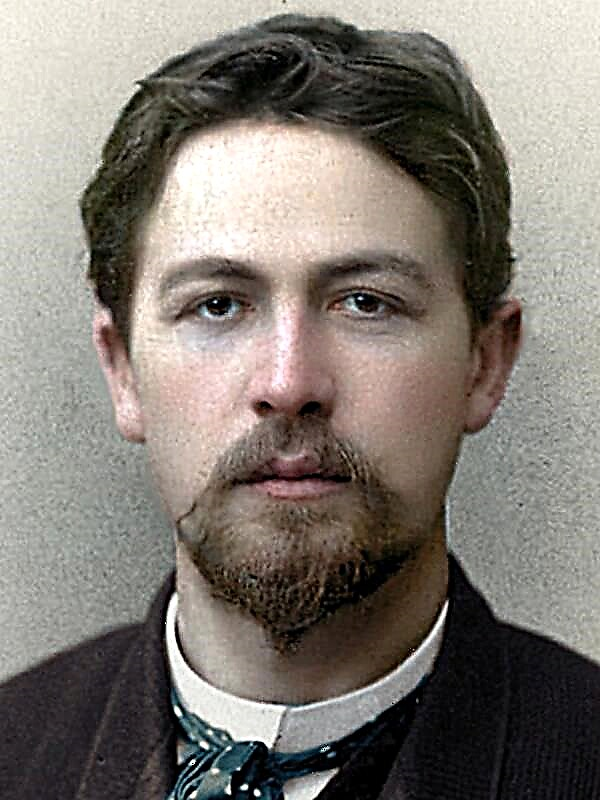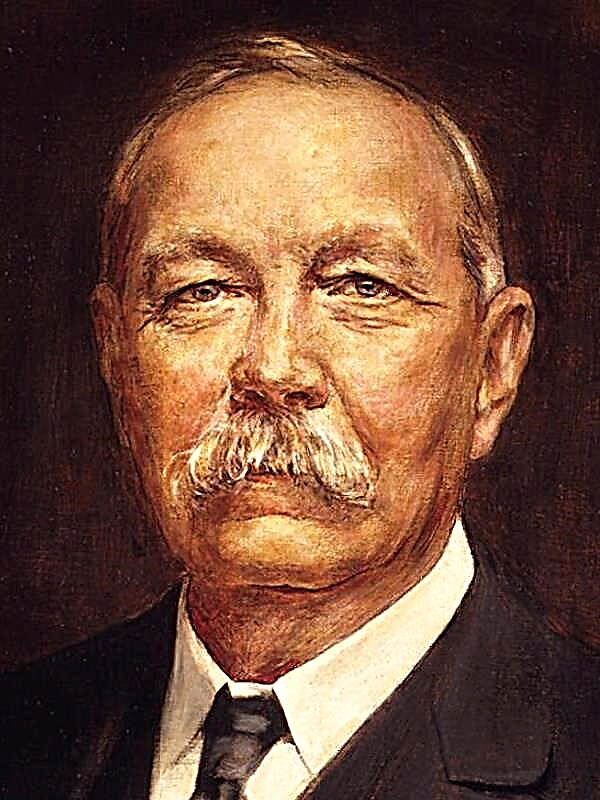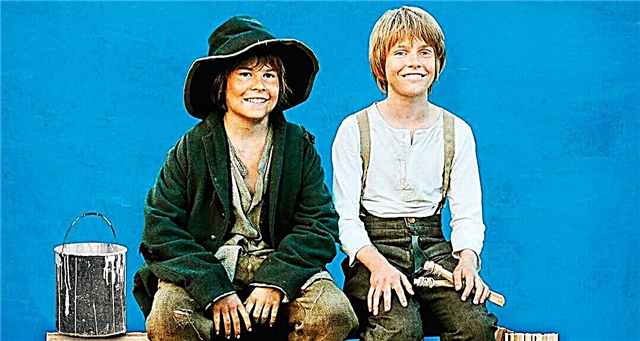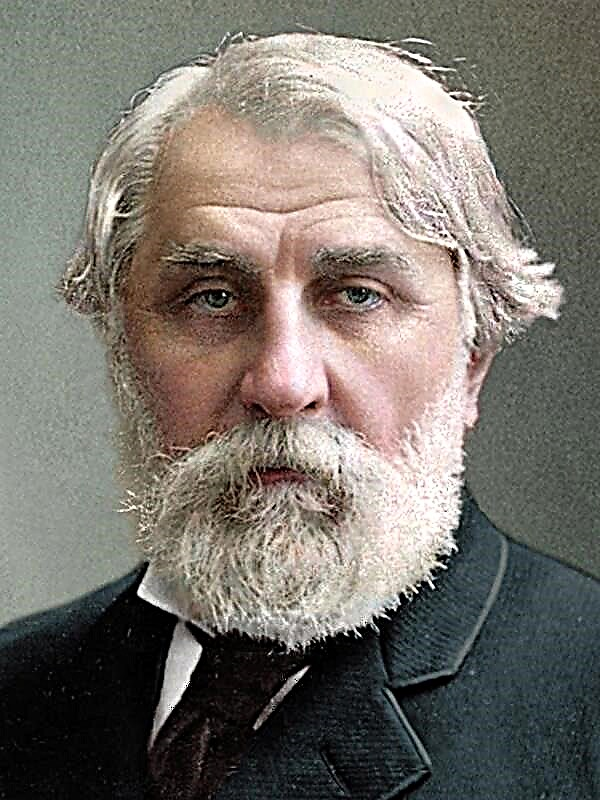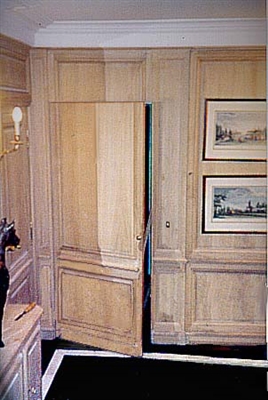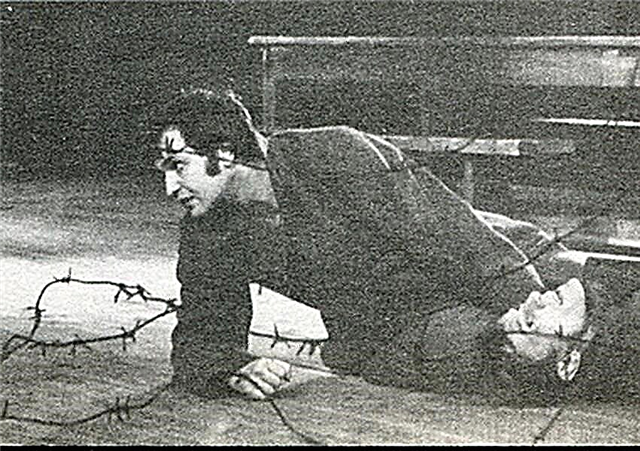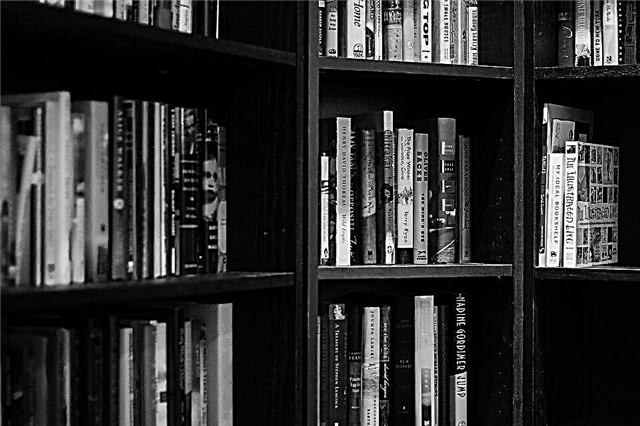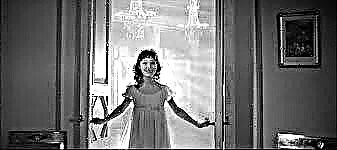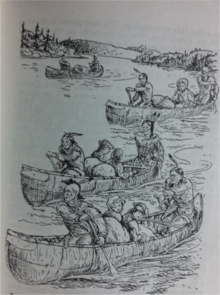XVI century. Henry, a boy from a noble French family who grew up in a provincial Bearn, having passed through the dangers of Bartholomew’s night, trials and intrigues, becomes King of France Henry IV.
Part I. Pyrenees
The boy's name was Henry. Mother instructed Heinrich to take care of a relative and educator, so that his son would grow up, as children among the people grow. He lived in the castle of Koarratz, and the area was called Bearn. When his grandfather, old Henry D’Albre, died, his mother called him home to Pau, where they kept a small yard. The old man d'Albre, the rural sovereign, owned the slope of the Pyrenees with everything that grew and multiplied there. He was called the king of Navarre. France was split in two by Catholics and Protestants. Across the country, they robbed and killed in the name of both warring faiths. The old man d'Albre was a Catholic without extremes, he calmly allowed to listen to Protestant sermons. The main thing for him was to prevent the king of France from taking too much power into his own hands.
After the death of the old man, his daughter Jeanne became Queen of Navarre. Her husband, Antoine Bourbon, was a general of the French king. He spent most of his time hiking. Jeanne loved him until he began to make lovers, but did not have high hopes for him. Jeanne d’Albre's mother was a sister to the king of France, Francis I. Jeanne became the queen, but this was not enough for her. Although the now reigning king of France had four more sons from the house of Valois, the ambitious Jeanne predicted an unusual fate for her son Henry. One day, Jeanne embraced the son of Henry and daughter Catherine and announced that they were soon going to Paris. Before the journey, the queen converted to the Protestant faith. This reinforced the influence of the new religion. Before leaving for Paris, her mother told Henry about the Queen Mother, Catherine de Medici, whom Jeanne hated. On the eighteenth day of the journey, they crossed the Loire to stay at the castle of Saint-Germain, where the Queen Mother lived.
Immediately after his arrival, Henry met with the young king Charles IX and the princes - the eldest, Henry, who was called Monsignor, and the younger, d, Alencon. Soon he met Princess Margarita Valois, who made a lasting impression on him. Catherine de Medici invited Jeanne to “buy back” her faith from her, but realizing that Jeanne was unbending, she decided to make friends with her. The Queen Mother did not even pay attention to the Protestant sermons that Jeanne arranged in the palace. Instead of expressing distrust to Jeanne, the queen suggested uniting against enemies. The greatest danger to the ruling house was Giza. Their rich Lorraine branch pulled to the French throne and enjoyed the support of Philip of Spain. The Queen did not take into account the poor Bourbons. She herself hoped for the help of the Spanish king. Jeanne went all the way towards Queen Catherine. This self-sacrifice was demanded from Jeanne by the interests of her son and faith.
Henry became the head of the gang, which turned out to be the entire young generation of the court, including the king and princes. Dressed in cassocks, they burst into important meetings and interfered with lovers. Catherine found out about this when a gang burst on top of her on donkeys led by Heinrich Bourbon. Soon Jeanne was asked to leave the courtyard. Henry was left with his father to make him a Catholic. Before leaving, Jeanne forbade the boy to attend Mass. Henry was sent to Navarre College, the most aristocratic school in Paris. Monsignor and the youngest of Giza also visited him. Both were namesakes of the Prince of Navarre, and their name was “Three Henry”. Jeanne started an open internecine war. Protestant troops led her brother-in-law Conde. Henry patiently endured punishments, so as not to go to the mass. He persisted in March and surrendered on the first of June. Father himself led him to Mass. Jeanne lost and was forced to flee south to her country, slipping away from General Monluck, whom Catherine sent in pursuit of her.
Among his comrades, Henry did not enjoy special love, although he managed to arouse fear and laughter in them. Even outwardly Henry was different from them. He was shorter than most peers, very dark, brown-haired and quick to invent. In his speech, native dialect still prevailed. From longing for his homeland, Henry fell ill. Father took Henry to the village, and he went on a regular campaign. Not even a month and a half had passed before Antoine died. Henry didn’t see his mother during this time. After the death of his father, Heinrich was appointed governor of the province of Guyenne. Monluck became his deputy. In return, Jeanne was allowed to raise her son, without being present in person. Heinrich again became a Protestant, but that didn’t even touch him, his motto was: “To win or die.”
Henry was 11 years old when he was taken on the great journey of King Charles IX in France. Jeanne demanded the exercise of her maternal rights, but Catherine remained indifferent. In the city of Bayonne, Catherine was visited by the Spanish ambassador, Duke of Alba. The meeting was held face to face in the guarded hall. Catherine and Alba spoke in a whisper, but Henry, who hid in a huge fireplace, heard them discuss the price of a dagger and guessed two names: Coligny and Jeanne. Henry knew before the term human malice and accepted the challenge of fate. On this day his childhood ended.
Part II Jeanne
Henry managed to talk with his mother only in Paris. He told her everything he heard while sitting in the fireplace. Then Jeanne arranged an escape. It was February when they arrived in Pau. Prince of Navarre was 14 years old. Soon, Prince Conde planned to attack the king of France. Jeanne demanded from Catherine the governorship of the province of Guyenne. Catherine refused. Coligny and Conde began a military campaign. To protect her son, Jeanne moved to the Setonj area on the ocean coast, where the main Protestant strongholds were located. Henry, meanwhile, was addicted to the game, women and feasts. He always lacked money. Only war could pay off his debts. Meanwhile, Jeanne arrived at La Rochelle, where she was completely safe. Henry was one of those who led a military campaign. Outwardly, he looked like a mother. The same high narrow eyebrows and caressing eyes, a calm forehead, dark blond hair, strong-willed small mouth. He was healthy and fit, his shoulders getting wider. However, he did not promise to be tall. The nose was long, its tip was slightly bent to the lip.
The war was started. Protestants were defeated, although outnumbered the Catholic army. Marshal Coligny had to sacrifice Prince Conde. Henry's turn came to become a leader. At that time, Henry was close friends with his cousin Conde, the son of the deceased prince. The army of Protestants united and began to threaten Paris. Catherine and Jeanne signed a peace treaty in which Protestants were given freedom of religion. Henry doubted that this agreement would be beneficial. A short period of peace followed. Jeanne ruled her small country, Henry - the province of Guyenne. He became more interested in women and increasingly changed them.
Catherine found out that Margot had an affair with Guise. This small fat woman with dull black eyes held fast to power and did not want to share it. Such a son-in-law, as Guise, did not suit Catherine. As a husband of Margot, she wanted an ordinary and obedient young man from a good family and chose Heinrich Navarre. At the same time, Queen Elizabeth of England decided to offer her hand to Henry in order to prevent the marriage of Henry and Margot, since this union united France and made it stronger. Decided to provide Henry. He chose Margot Valois. King Charles was sick, and the princes were not healthy either. Henry understood that by marrying Margot, he would be one step closer to the throne. To prevent Catherine from luring Henry into a trap, Jeanne herself decided to go to the Medici court. Joan of Albre sacrificed her life.
Meeting with Madame Medici, Jeanne demanded that Margot accept the Protestant faith. All winter she haggled with Madame Catherine, feeling her strength diminishing every day. Margo wanted to warn Jeanne about the danger, but soon the impulse passed: yet she was the daughter of the Medici. And Madame Catherine decided in one fell swoop to put an end to the annoyed Protestants on the day when the Prince of Navarre arrives at the court with his Huguenot retinue. It remains only to convince King Charles that his favorite Admiral Coligny is the enemy. It was not difficult, the loose and painful Karl was timid and easily infuriated.
Henry set off along with his cheerful and young retinue. Henry understood that he was making this journey on the orders of Madame Catherine. He knew how to soberly look at life, and it was difficult to deceive him. Waking up one morning, Henry saw his mother in some space that was not the grayish morning air. A bright, terrible light flashed inside him, and in him Henry saw Jeanne already dead. On the way, Henry met a messenger who said that the Queen of Navarre had been poisoned. Henry vowed revenge. The messenger brought his mother's testament and told him that his sister also wanted to go, but she was detained. The Huguenots flocked to Henry from all sides. He wanted to come to Paris with great strength, as Joan required. Henry entered into combat with the main dangers that life sends us - to be killed or a devotee.
Part III. The louvre museum
Henry rode to his wedding, at times succumbing to the vengeful mood that reigned in his retinue. So he reached a place where it was too late to return. Here Henry was waited by the courtiers, who were entrusted with the solemn meeting of the groom, headed by his uncle - Cardinal Bourbon. From that moment on, the detachment of the rebellious Huguenots turned out to be a prisoner of the cardinal, as it were. The next day they reached the outskirts of Paris, where Coligny himself met them. Despite the magnificent meeting, the streets of Paris were deserted, the goods in the windows of the shops were removed, the shutters were locked. To Henry heard hostile exclamations. Staying with Prince Conde and greeting his sister, Henry went to the Louvre, where she sat, like a spider, an old witch who deprived him of his mother.
Catherine de Medici was in mourning. She assured Heinrich that she deeply mourned for Jeanne. At that moment, Henry felt that his mother’s killer was regrettable. Evil, when it is already decrepit, causes laughter, even if it continues to kill. Wanting to accuse the queen of murder, Henry demanded an explanation. Catherine introduced him to two respected doctors who vowed that Queen Jeanne died a natural death.
Faced with Margot, Henry burned with passion for her. Margo realized that the way was new to the son of poor Jeanne. Feelings awoke in her, previously unknown to her. After the engagement ceremony and the banquet, Henry managed to secretly get out of the Louvre. In the Conde Palace, Henry met with Marshal Coligny. The old man believed that Catherine accepts Henry for the only reason: that Jeanne’s religion should lose her leader, and advised the prince to return home to Navarra. Henry brought this marriage closer to the throne. He dreamed of rallying France against its true enemy - Spain. He stayed. From now on, his life will flow along the edge of a wide abyss.
Part IV Margot
On August 18, Margo married Prince Heinrich of Navara. Monks wandered around Paris, predicting the grief and death that the Huguenots would fill, filling the city. All fanatics of faith were dissatisfied with this marriage. The morning after the wedding, Henry got up early and went to wander along the corridors of the Louvre. The young maid of honor, whom he managed to conquer, took Henry to the attic, from where a secret room was visible through a small hole. In it, Henry discovered Madame Catherine, d, Anjou and Giza. They planned someone's murder. Henry did not understand exactly who they wanted to kill: King Charles, Coligny, or himself. Soon everyone dispersed. Having returned to his place, Henry found the corpse of a young maid of honor near his door. Meanwhile, Margot had a prophetic dream in which God told her: “Do not kill!”. Dressing quickly, she went to her mother. Catherine was Charles IX. Together, they tried to force Catherine to cancel her bloody plans. They demanded that Henry and Coligny be kept alive. Catherine allowed Margot to take her husband to England. After this small victory, Margot and Karl returned to that subordinate position in which they had lived their whole lives.
Margo tried to persuade her husband to go with her to England. “It all depends on Admiral Coligny,” Henry replied. Later, Margo realized that these words were only an excuse, Henry was too brave to run. From the palace of the Duke of Anjou, the guests migrated to the Louvre, where the celebration continued. There, Henry was surrounded by his nobles and tried to forcefully take away from Paris. King of Navarre flatly refused and returned to the holiday.
On August 22, Admiral Coligny was wounded in the arm. Charles IX was furious and scared by this incident. Soon it became known that the murderer was sent by Guise. The king vowed to avenge this atrocity. Suddenly, Madame Catherine supported him. She almost convinced Henry, as she was sincere in her own way. The attempt on Coligny happened too early. The city was seized with excitement. In all the houses located near the dwelling of Coligny, Carl placed the Huguenots. Madame Catherine was waiting. She gave the instruction to her youngest son, and the head of the detachment guarding Coligny became the admiral's worst enemy, a certain Kossen. At night, Madame Catherine, accompanied by Dr. Anjou, entered Karl’s chamber. They began to prove to the king that Coligny threatened his life and the throne. Karl was gradually broken. “May all the Huguenots in France perish!” He shouted, stamping his feet in fury. Catherine took advantage of this. It was August 24, 1572, the day of St. Bartholomew. The bell rang at the Monastery of Saint-Germain l, Oxerrois. It was a signal. Volunteer townspeople took to the streets, recognizing each other by the white bandage on the sleeve and the white cross on the hat. Everything was provided in advance. Coligny was provided by Mr. Giz. The admiral’s body was thrown into the street, at the feet of the nobles crowded there.
Waking up in the morning, the young king of Navarre, accompanied by Conde and forty nobles, went to Karl. On the way to the king they heard the alarm. At that hour, armed men attacked the Huguenots. Someone grabbed Henry by the hand and dragged into one of the rooms, Conde followed him. It was a bedchamber. Carla. He personally locked the door behind them. Standing at the door, they listened to the noise of battle. Some time later, the Queen of Navarre entered the room. She asked Carl to give life to several Huguenots. Charles, however, was seized by a boundless aversion to everything that was happening. Remembering his mother, he played a fit of rage, which he mastered perfectly, and became what he was forced to be - the cruel Karl of Bartholomew’s night.
Through the deafening sound of bells, heart-rending screams, screams, howls erupted. All were occupied with only one thing: they killed or died. The venerable citizens carried with them heavy bags full of money. Henry looked at it from the window of the Louvre. After the death of Coligny, he was left alone.
Part V. School of Unhappiness
Henry remembered his mother, Coligny. Burning remorse seized him. His thoughts were replaced by some hop. Henry jumped up and began to bang his head against the wall. He was kept by a faithful servant, d, Armagnac. Soon, nobles appeared on the threshold of the room, who escorted the King of Navara to the great hall of the Louvre. It was dark: a huge flock of crows descended on Paris and obscured the sun. Charles IX boastfully declared that he personally shot from the balcony at the Huguenots.In fact, he tried to miss, but did not boast of it.
Catherine de Medici looked at herself as the main weapon designed to subjugate France for the sake of the ruling house. Even on Bartholomew’s night, she acted with a clear conscience. In the evening, Catherine staged a magnificent spectacle, which she directed from her chambers. Queens, duchesses, and princesses shining with jewels rode through the main hall. Henry did not see anything, did not perceive neither the sounds nor the smells of incense. He smelled of blood, heard a heart-rending howl. All evening, Henry held himself in control and shunned everyone, trembling with hatred.
Soon news came from Europe. It turned out that the massacre revolted distant and weak countries. Elizabeth of England approached the events in a very businesslike way, on her account Madame Catherine soon completely calmed down. Catherine dealt with Navarra and Conde as a loving mother. Henry pretended to be obedient, but dull. Soon it became clear to the whole kingdom that Bartholomew’s night did not lead to anything. “Dumping enemies is a simple matter; but we must be sure that they will not rise again and will not be twice as strong, ”Charles IX muttered under his breath.
September 29, the day of St. Michael, Heinrich of Navarre had to endure the mass. He was forced to write a decree regarding Bearn Protestants and send a letter of confession to the pope. Catherine decided to accuse Heinrich of male impotence and to get divorce from Rome. The son-in-law was no longer useful, and Margot could again be married favorably. Catherine scornfully called Henry king. That evening, Henry again lay down on the conjugal bed. He did not forget that his daughter spends whole days in the mother’s chambers. Now a trick controlled his life.
A religious war was going on in the country again, famine began. The Duke of Anjou wanted more and more to Poland, whose throne was procured for his beloved Catherine. Poles arrived in Paris to come for their king. The entire court accompanied the Polish king to the very border. Karl was harmed, and he had to be left in Vitry. Only Henry remained with him, because he hoped to escape, but Madame Catherine did not take her eyes off him. On May 31, 1574, Karl died. The doctor could not stop the blood flowing through the pores of the skin. He was 23 years old.
Part VI. Weakness of thought
Henry constantly came up with escape plans, but they invariably failed. But gradually he calmed down. Some saw him as a court jolly, others sought lofty feelings, but he led everyone by the nose and took every opportunity to express his admiration for Madame Catherine. Both were curious about each other and kept alert. Henry III, former king of Poland, reigned on the French throne. In the Louvre, the king was captured by his mother. The king's concubines abused his lack of will.
Henry became close to Giza out of hatred: he wanted to know his enemy better. But when you recognize the enemy, there is a danger that you will find him not so bad. The debauchery of the court, meanwhile, crossed all borders. The king spent millions on his lovers and dubious entertainment. It was at this time that Giza, using Spanish gold, founded the League to gain power in the country. The Parisian crowd supported Henry de Guise, because he was the idol of the mob. Henry of Navarre hated Philip of Spain because France suffered because of him. He tried to warn Madame Catherine, but she believed that Philip was her friend and did not understand that the King of Spain was looking for a viceroy in France, but Henry was beginning to understand this. Throughout the country, roving monks incited the people against the king, and lists with supporters of the League went.
Margot and Henry were connected by a sincere friendship, which Catherine could not destroy. They even warned each other when one of them was in danger. September 15, 1575 the youngest son of Madame Catherine fled to rebel against the king. From that day on, Catherine established even stricter control over Henry. The prince nearly thwarted all of Henry's plans. Nevertheless, Henry did not doubt his success: Madame Catherine's school was not passed in vain. The more false leaders the people reject, the more inevitably their true leader will appear.
The escape of Henry took place on February 3 during the hunt. The fugitives decided to seek refuge in the fortified cities of the Huguenots. In Alencon, the detachment of Henry totaled about 250 nobles. The camp stopped in Saumur, in the afternoon passage from La Rochelle. Henry's court turned out to be a court without religion. Cousin Conde was irreconcilable, but Henry kept in touch with La Rochelle. He called his sister to him and on June 13 renounced Catholicism. On June 28, Henry solemnly entered La Rochelle.
Part VII. The burdens of life
King of Navarre chose Nerac as his residence. This city lay approximately in the middle of the country, which he now had to rule. It included the Kingdom of Navarre and the province of Guyenne, in the capital of which the governor of the French king still sat. Henry willingly visited the poor, but they did not know that they were taking the king: in a shabby jacket, in a felt hat and with a beard, he did not look very noble. Henry understood that he could not be otherwise. He lived in a village and milled flour in his mill. So they called him: "Miller from Barbasta." And yet he was obliged to remain king and secret, which he succeeded without difficulty. There were no fewer Catholics at the court of Heinrich than there were Protestants, and he tried to make this notice.
League Giza did not stop sowing turmoil, so Henry III convened the General States in his castle in Blois. Henry of Navarre wrote a message in defense of peace. He tried to do everything possible so that the internecine war would not break out again. Henry sought from the French king to return his sister and wife. Faithful Fervak delivered Catherine safe and sound, and his brother escorted her to Poe. Margot, however, dashed off to Flanders with the Monsignor, whom she helped to escape. The army of the King of Navarre wandered around the country, tirelessly taking revenge, instilling peace and establishing order. Soon, Henry III appointed the new governor of the Province of Hienn - Marshal Biron. He was given the right to dispose of the province in the absence of the King of Navarre.
Henry could not help but see that he was being worshiped less and less, not only because of love affairs, but also as a ruler. The day is approaching when the governor Biron takes all power into his own hands. Henry began a strange war against the governor. He made sure that the country knew which wine hunter Marshal Biron. These rumors restored noble youth against the governor, who no longer drank without measure. Soon it became known that Biron promised to capture Henry and deliver to Madame Catherine. Then Henry was frightened and decided to put the marshal in a ridiculous position. For this q, Obigne disguised himself as Madame Catherine and scared the Marshal half to death. They laughed at Biron, and he fell ill with anger and humiliation. While the marshal was ill, Henry managed to repay him for many atrocities.
Soon, Catherine learned that the cities are moving to the side of Henry. She could not allow this and decided to go there on her own behalf under the guise of what the King of Navarre was carrying. Henry got a meeting with Catherine at the Custer Manor - the very one where Biron was disgraced. Henry accused the marshal of betrayal, he spoke on behalf of the kingdom, which he defended, spoke already from the throne. Hearing this, Catherine turned green even more. Henry again became close to Margot. She told him about the arbitrariness that reigned in the kingdom, that instead of the king, the League rules everything. Until now, her relatives saw in Henry the enemy who seeks to take power from them, but for Margo he was a savior. Madame Catherine talked about the world, but the fame that went about her contradicted her words.
Part VIII. Road to the throne
The relationship of the spouses did not go well. Margo refused to live in Poe because she suffered resentment from the Huguenots - she still remained a Catholic. Then, with Henry, his usual fit of weakness and unexplained fever happened. He lay in bed for 17 days. All this time, Margo did not leave him. Upon returning to Nerac, the Queen of Navarre was allowed to open her own yard and even make a young dandy of the King of Navarre. For 10 months they were happy.
After recovering from the illness, Biron became even more malicious, trying his best to slander Henry before Henry III. In turn, Margot hated her brother and tried to set Henry against him. Henry decided to punish Marshal Biron. A victory was won over the governor, which brought Henry fame. The courtyard in Paris found out about this and recalled Biron. The Duke of Anjou hastened to conclude peace and alliance with his son-in-law. Only Conde remained intransigent - it’s hard to come to terms with the fact that you will remain in second place for life, although you did your duty no worse than your opponent. Due to the fact that Henry did not refuse the help of the papists, Conde insisted on the purity of the Protestant teachings. He went on a plot against a cousin. The conspirators wanted Henry to lead his troops to help the archbishop of Cologne, who converted to Protestantism. Going to Germany meant giving up the conquered, losing the kingdom. This is exactly what they wanted, demanding that Henry leave their country for the struggle for religion. But Henry will not do that. They knew this very well and could cause hatred among the Protestants, and the message that Henry did speak could push Philip of Spain to a formidable decision.
Finally, the whole kingdom of Henry became his property. The new governor was not his enemy. Ordinary people called him simply: our Henry. They felt that the dangers receded, and the world became sustainable. Margot found out that Henry was cheating on her with her maid of honor and her pupil, young Fossese. Margo behaved cautiously, she could not forget the years of happiness and hoped that Henry would return. Soon, she discovered that Fossise was pregnant. Margo was bitterly aware that she could not give Henry the heir. She realized that her happiness had come to an end. Together with hope, she lost her temper, gave vent to her temperament and ceased to be faithful to her husband.
Henry took Fossese to the secluded village of O-Chaud, and Margot lived in the town of Bagnere and was treated for infertility with local waters. When Margot returned to Nerac, she had to help Fossese during childbirth. The danger has passed - a girl was born. To preserve her dignity, Margot went to Paris and took Fossese with her. She no longer hoped to give birth, and withdrew so that hatred would not break out between her and Henry. They tried to use Margot to lure Henry into the old cage. She wrote to her husband that Guise was old, and the rest of the enemies were completely exhausted. She herself did not know why she was doing this. Reading the letters of Margot, Henry involuntarily saw them as a betrayal. At that time, he had a new lover - Countess Diana de Gramont, a rich, smart and sophisticated woman. Soon, Margot returned home, and Henry forgave her.
The Duke of Anjou has died. Henry III was the only one of the Valois family, and he could not have children. He turned his brother’s funeral into a sumptuous feast. King Henry III had fun - only that was left to him. The league was expanding, covering with its tentacles the entire state. There was no one to protect the king. Margo left her husband again and fortified herself in the city of Agen. Soon Henry was visited by King Henry III. He decided, in spite of him, to appoint Heinrich of Navarre as his heir. Returning to Paris, the king announced this to Gizam. Everything is completely confused. The king sent troops against the Giza, then against Navarre. It was a war of existence.
Henry had too many enemies. The only salvation for him was to advance, to transfer the war to Paris. King Henry III ran out of money, the mercenaries fled. People flocked to Heinrich of Navarre from everywhere, and he dug trenches, ate and slept with them. He could easily defeat Henry III, but did not do this: the two of them still had to defeat Giza.
Part IX. Dead on the road
On May 9, 1588, the Duke of Guise secretly made his way to Paris, despite the weak resistance of Henry III. The people and respectable citizens unanimously despised the unfortunate king, only parliamentarians, supreme judges of the kingdom, sided with him. The crowd was for Giza. “Guise is the crutch of my old age,” said the very old Queen Catherine. Giza visited Mendoza, Ambassador of Don Philip. The true owner of Giza ordered: three days later, France should be engulfed in a civil war. The Spanish Armada was ready to move to England. Giza was required to provide her with parking in French harbors. The king, in a hopeless situation, called in the city of German and Swiss mercenaries. This served as the last pretext for the rebellion. The mercenaries were defeated, and Henry III had to ask for his soldiers. Guise was no longer able to raise his hand against the king, although Meodos demanded exactly this. So the great confusion began. The streets were full of monks who, under the rumble of the alarm, called for a massacre. Sister Giza, the Duchess of Montpensier persuaded the monk Jacob to kill the king. Guise secretly left one unoccupied exit for Henry III, and the king fled with the consent of his enemy. He remembered his cousin Navarre, and he wanted him here.
Henry himself was very afraid of poison since Prince Conde died. 24 murderers, one after the other, sent in those days to the King of Navarre. Henry III sent his messengers to him to encourage him to convert to Catholicism. Only then did Henry become the undisputed heir to the throne. But Henry knew that this could be taken for weakness. Only after many years, when he, already gray-haired, will conquer and unite the kingdom, will he voluntarily go to mass.
Henry III moved to Blois, and now Guise and the League leaders followed him. In addition, every rabble from the capital was transported there. The king called the General States, and legal scholars were also forced to take part in the atrocities. Meanwhile, news came of England's victory over the Spanish Armada. Inspired by the example of England, the courtiers of Henry III began to beg him to call on the King of Navarre. Soon, Henry learns that the king killed the Duke of Guise. For 14 years, the League set the mob against the king, and finally took the last power from the kingdom. The king at that time was so poor that even Henry of Navarre had not been. Guise settled in the castle, where the king lived, to hold him tightly in his hands. Giza was killed in the bed of the king, and the king looked from behind a hollow bed. Brother Giza, Cardinal of Lorraine, the king ordered to strangle in prison, the third brother, Mayenne, was sought. The round dance of the dead did not stop throughout 1588. In the same year, Catherine de Medici died. This news struck Henry.
Soon, both kings made a ceasefire for a year, and Henry set out on the road with his army. The closer he came to the Tour, where Henry III gathered his parliament, the more boldly learned men became. On April 29, they entered into an agreement between the kings in the code of laws of the French kingdom, and on the 30th Henry of Navarre arrived with his army. The kings met in the castle park of Du Plessis and hugged like brothers. The league fled in fear. The king’s army was growing, and Mayenne’s army was melting before our eyes. Even in besieged Paris they dug openly. The league now consisted half of possessed, half of cowards. July 30, the royal army took Paris. Two days later, an attempt was made on Henry III. He was stabbed into the stomach by a nun named Jacob. The wound was fatal. The courtiers decided to betray the kingdom and go with the League. They demanded that Henry immediately change his faith - the king of France should be crowned with the hand of the church. Henry refused.
The army of the new king began to melt. Fidelity to Henry was retained only by Biron. Henry wrote an appeal to the French, in which he stated that he guaranteed both religions their former position.On August 8, Henry withdrew from the camp and moved north, hoping to get help from the Queen of England. On the 26th he stood at the walls of Dieppe, the city immediately opened the gates to him. The battle with Mayenne took place. The Huguenots fought to the sound of the psalms and won. At 36, Henry became king of France.
Too many participants in his fate were carried away by disasters, and death tried too hard to clear his path. On the battlefield, King Henry wept under the song of victory. That day ended his youth.

